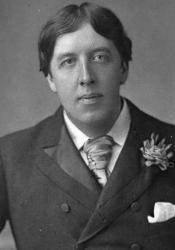April 3, 1895- May 25, 1895: Trials of Oscar Wilde
One of Literature's best authors Oscar Wilde went on trial for having an affair with a man and in this time being gay was a crime punishable by death. Before this trial Oscar Wilde was gaining popularity due to his playwrights, novels, and poems. Oscar Wilde was known for his amazing work and his flamboyant dress along with his cutting wit and eccentric lifestyle often put him at odds with the social norms of Victorian England.
Oscar Wilde did, however, marry a woman named Constance Llyod and together had two sons named Cyril and Vyvyan. Oscar Wilde was hiding his sexualitty from the world and his family until he met a man named Lord Alfred Douglas who was a young (sixteen years younger) poet and aristocrat from Britian. The news about their relationship spread all over Britian like wild fire. Soon The British Government wanted to arrest Wilde right away for his homosexual acts however instead of running away he decided to sue the Marquess of Queensberry for defamation.
This is when our trials offically begin! Central Criminal Court of England and Wales, commonly known as Old Bailey was the location of the trials. During this trial Oscar Wilde got destroyed The trial went poorly for Oscar Wilde. His main problem was that the allegations about his homosexuality were true, and therefore he couldn't win the trial. However there were some things that they accussed Wilde of that didn't make sense such as: seducing 12 other young men to commit sodomy and the idea of homoerotic themes within his works.
After three days of the court proceedings, Wilde’s lawyer withdrew the lawsuit. The British authorities saw this withdrawal as a sign of implied guilt and issued a warrant for Wilde’s arrest on indecency charges. The Britain’s Criminal Law Amendment Act of 1885 had criminalized all sex acts between men as “gross indecency.” (Sex acts between women were never made illegal in England.) His friends begged Oscar to flee Britian and head to France so he wouldnt face the trial for a second time. However, Oscar stayed and decided to attend the trial with no attempts of escape or denial.
Oscar Wilde was tried for homosexuality on April 26, 1895. He pleaded not guilty on 25 counts of gross indecency. The trial ended with the jury unable to reach a verdict. Three weeks later, Wilde was retried. This time, Wilde was convicted of gross indecency and received two years of hard labor, the maximum sentence allowed for the crime. On May 25, 1895, Oscar Wilde was taken to prison. He spent the first several months at London’s Pentonville Prison, where he was put to work picking oakum. Oakum was a substance used to seal gaps in shipbuilding. Prisoners spent hours untwisting and teasing apart recycled ropes to obtain the fibers used in making oakum.

